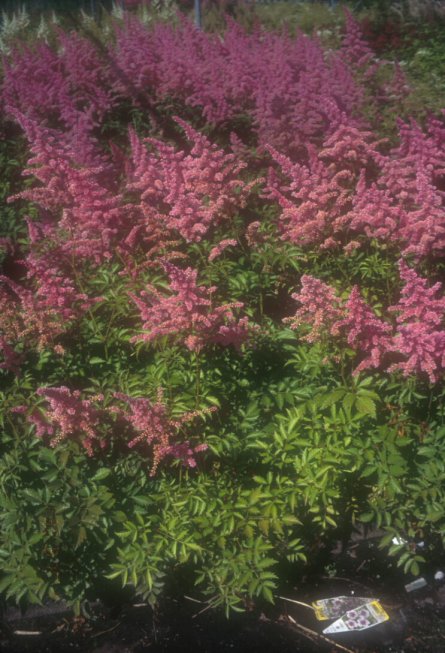| Botanical Name: Astilbe x arendsii 'Rhineland' | |
| Common Name: False Spirea |

-
Anatomy
-
Culture
-
Design
Plant Type
Perennial
Height Range
1-3'
Flower Color
Pink, Red, Violet, White
Flower Season
Summer
Leaf Color
Green
Bark Color
n/a
Fruit Color
n/a
Fruit Season
n/a
Sun
Half
Water
Medium, Extra in Summer
Growth Rate
Moderate
Soil Type
Loam
Soil Condition
Rich, Moist
Soil pH
Neutral
Adverse Factors
n/a
Design Styles
Meadow
Accenting Features
Showy Flowers
Seasonal Interest
Summer
Location Uses
Perennial Border, Patio, Swimming Pool, With Rocks
Special Uses
Container
Attracts Wildlife
n/a
Information by: Monterey Bay Nursery
Photographer:
Photographer:
-
Description
-
Notes
These clumping, deciduous perennials have ferny leaves and tall, feathery spikes of reddish flowers in spring and early summer. The best bloom occurs in full to part sun to 24-30". They make an excellent cut flower, requiring average watering.
-Monterey Bay Nursery
Grow in average to loamy, medium, well-drained soils in part shade to full shade. Prefers moist, humusy, organically rich soils. If regularly watered, foliage will usually remain attractive throughout the growing season. Mulch helps retain soil moisture. Chinese astilbes are generally noted, however, for having better sun and drought tolerance than other species of astilbe. Removing faded flower stalks will not prolong bloom but may improve plant appearance, particularly if a ground cover look is desired. On the other hand, many gardeners leave the flower stalks in place after bloom because of the continuing ornamental interest of the dried seed heads. Divide clumps when overcrowding occurs (every 3-4 years). Not a low-water plant, but one of those that is habitually over-watered.